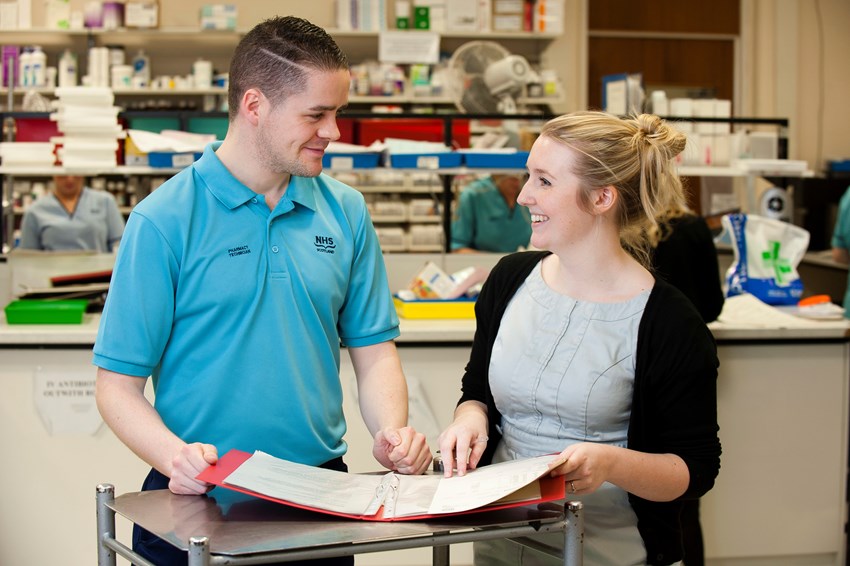Previous
Pharmacy support worker
You can become a pharmacy technician in Scotland by completing the Technical Apprenticeship in Pharmacy Services at SCQF level 8.
Pharmacy technicians are registered healthcare professionals who carry out specialised tasks, such as preparing and dispensing complex medicines for patients. They also help people safely take and store their medicines and provide healthcare advice.

To apply for the Technical Apprenticeship in Pharmacy Services that would lead to a career as a registered pharmacy technician, useful subjects include:
Speak to your guidance teacher about subjects offered at your school.

You may find it helpful to get some healthcare experience by doing a work placement or volunteering. You’ll get training, increase your knowledge, and learn new skills. This could help you when applying to university, college or a new job with NHSScotland.
The Technical Apprenticeship in Pharmacy Services is the route to becoming a registered pharmacy technician.
You’ll start your career as a pre-registration trainee pharmacy technician and get experience working in hospitals, primary care, and community pharmacies.
After you complete the 2-year apprenticeship programme, you’ll be ready to register with the General Pharmaceutical Council (GPhC). You must maintain your professional registration each year.
You can apply for pre-registration trainee pharmacy technician vacancies on our recruitment website.
As a pharmacy technician, you’ll prepare and dispense medicines safely and carry out accuracy checking to guarantee they are safe to take. You’ll also help patients manage their medicines while keeping a record of their medicine history.
Your role may vary depending on where you work.
In a community pharmacy, you'll give health advice to people about sexual health or stopping smoking.
In a hospital pharmacy, you'll review medicines, provide counselling, and give advice on different treatment options. You’ll be expected to provide a link between wards, patients and the pharmacy. You could also be involved in aseptic work, such as preparing feeds or chemotherapy medicines for patients.
In primary care, you could be working in a GP practice. You’ll do medication reviews and work with other healthcare professionals to provide effective patient care.
Tasks include:
You'll need these skills:
Pharmacy technicians work with other healthcare professionals, including:
You could work in:
As a pharmacy technician, you must complete yearly revalidation to maintain your registration with the General Pharmaceutical Council. You must also keep your skills and knowledge up to date and reflect on how to improve.
As you gain experience as a registered pharmacy technician, there will be many opportunities for you to progress. With training, you may choose to specialise in an area of pharmacy such as:
When you become a qualified pharmacy technician, you must register with the General Pharmaceutical Council to work in the NHS. You can also join the Association of Pharmacy Technicians (APTUK).

Discover the skills and qualifications you’ll need for each role and what the work will be like.
Explore careers
Our blog includes how-to guides, case studies, and career resources.
Discover more